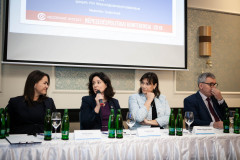73 percent of adult Hungarian society, or nearly 6 million people consider it a good decision that the government has made families the focus point of its support payment scheme. Eight out of ten people (79 percent) say that lack of financial security is the main obstacle to having children, and 60 percent believe that health reasons play a role. Recognising the latter issue, the Hungarian government wishes to manage the support of infertile couples as a priority, was announced at a Nézőpont Intézet conference on population policy.
State Secretary for Family and Youth Affairs Katalin Novák stressed in her presentation that human life must not be subject to business considerations. The negative trends reflected in demographic indices are not an isolated Hungarian phenomenon. A further problem in Hungary is that fewer young people have to have more children due to an unfavorable age structure. In 2016 there were 270,000 less people of fertile age compared to 2001. The government’s family policy measures, however, are bringing about positive changes, such as the the number of marriages per month breaking a 40-year record. Since 2010, fertility rates and the desire to have children have also increased. The cabinet spends 5 percent of GDP on family support, but there is still room for improvement, as the fertility gap is high and 150,000 couples are affected by infertility. Since one of the government’s family policy principles is for all couples to have the number of children they wish to have, issues surrounding infertility will be given closer attention in the future, emphasised Katalin Novák.
Nézőpont Intézet CEO Ágoston Sámuel Mráz pointed out in his presentation that the good economic environment, improved standard of living and nationwide support for the government’s family policy goals would help achieve population policy goals. However, a public opinion poll conducted by Nézőpont Intézet reveals that a large majority (79 percent) still think that a lack of financial security is the main obstacle in the way of having children. Six out of ten Hungarians say health problems like infertility also play a role. This is also shows that Hungarians want to have more children than they will end up having, even if the number of abortions has decreased in recent years, he concluded.
It was stated at the conference that at present every seventh Hungarian or about 300,000 people are affected by infertility problems. In order to manage the situation, redefinition of the protocol system that clarifies the conditions of infertility care, and securing a modern system of tools for treatment are necessary. Establishing an appropriate incentive system to avoid late childbearing, comprehensive and continuous national infertility screening programs, and informing society about the problem are also needed.
Enrica Gravotta, Merck’s fertility science director responsible for the Europe, Middle East and Africa region, emphasised that the biological clock is ticking, with many people wanting to have children in their 30s, while the most fertile period is between the ages of 20 and 30, when the chance of getting pregnant is still high, before falling below 20 percent at age 30 and below 5 percent at age 40.
Dr. Miklós Sipos, director of the Center of Assisted Reproduction at Semmelweis University, also said that infertility was an endemic disease worldwide. Women wait longer and longer to give birth, and a high body mass index, smoking and starting a family at an older age are among the factors contributing to infertility. Infertility is a couple’s disease, in which men play a role as much as women. Therefore, it is necessary to improve and monitor male fertility as well.
Experts at the conference also urged the government to renew the outdated, 22-year-old legislation in relation to infertility treatment. Finally, Dr. Emil Toldy-Schedel announced that the Association of Ecclesiastical Hospitals would be launching a screening, education and awareness program with support from Merck.
























